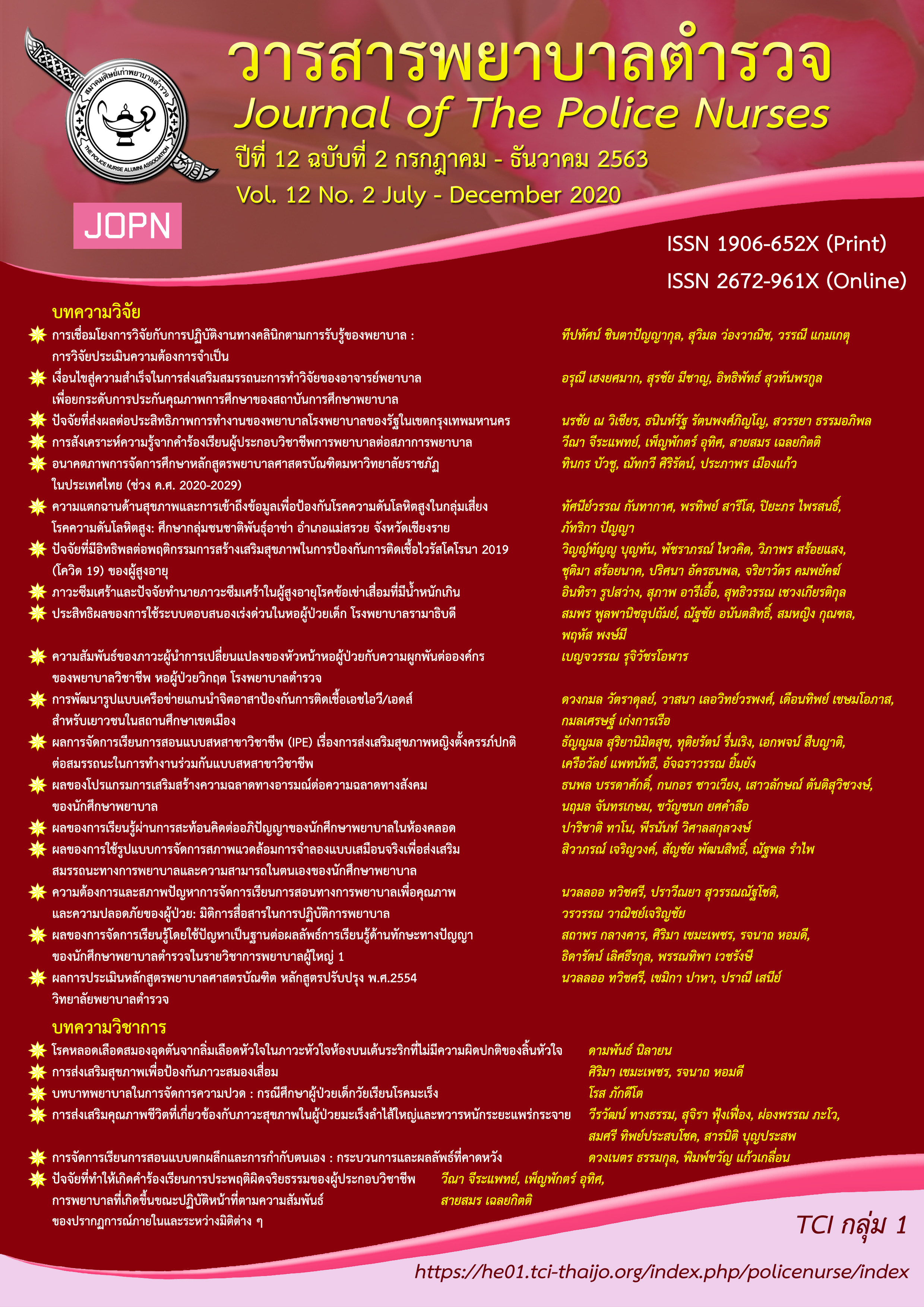DEVELOPING A MODEL OF VOLUNTEER SPIRIT OF THE PEER GROUP IN PREVENTING HIV/AIDS FOR THE YOUTHS IN ACADEMIC INSTITUTIONS IN THE CITY
Keywords:
voluntary spirit of peer group, HIV, AIDS, youth, academic institutionAbstract
This mixed-method study was aimed to examine the behavior of HIV prevention and volunteer spirit of the peer group among teens as well as to develop a volunteer spirit model of HIV/AIDS prevention in academic institutions. The study was separated into 2 phases. Phase 1 - descriptive research, was conducted to study HIV/AIDS preventive behavior and volunteer spirit of HIV prevention in 1,765 teens from 20 secondary and vocational schools in Bangkok. Data were collected and analyzed using descriptive statistics. In phase 2, focus group discussion with semi - structured and audio-recorded interview was conducted with a total of 100 informants composed of 80 teens and 20 teachers who participated in the program encouraging volunteer spirit of a peer group in HIV/AIDS prevention. Data were transcribed and themes were identified through content analysis. The model of the volunteer spirit of the peer group in preventing HIV/AIDS was synthesized using the results of a qualitative study and reviewed literature.
Results showed that 46% of teens were at risk. Both female (M=2.26, SD=.37) and male (M=2.18, SD=.40) teens had an M score of the volunteer spirit of a peer group in preventing HIV/AIDS at a fair level. Moreover, the M score of awareness of female youth (M=3.89, SD=.35) and male youth (M=3.87, SD=.37) was at a high level. The M score of avoidance of sexual intercourse was at a high level in female youth (M=2.74, SD=.20) and male youth (M=2.71, SD=.23). In addition, the M score of the volunteer spirit of preventing HIV/AIDS of female youth (M=2.26, SD=.37) and male youth (M=2.18, SD=.40) were at a fair level. A model of volunteer spirit of the youth peer group in preventing HIV/AIDS in academic institutions in the city was synthesized as 1) self-empowerment, 2) peer group empowering, and 3) empowering people in the community to raise awareness of HIV/AIDS. The ‘volunteer spirit’ models of HIV prevention can be applied to improve the quality of sex education programs in schools, help to shape sex education policy to empower youth volunteer spirits for preventing HIV/AIDS, and also encourage community involvement.
Downloads
References
AIDS TB and STIs Control Division. (2019). Bangkok HIV & AIDS situation Bangkok: AIDS, TB and STIs Control Division.
Aramsin, R., & Prachanno, W. (2016). Communication on sex education between parents and adolescents in family. Journal of Health Sciences Scholarship, 3(2), 30-40.
Ballard, P. J., Cohen, A. K., & Duarte, C. d. P. (2019). Can a school-based civic empowerment intervention support adolescent health?. Preventive Medicine Reports, 16, 100968.
Bamise, O. F., Bamise, C. T., & Adedigba, M. A. (2011). Knowledge of HIV/AIDS among secondary school adolescents in Osun state, Nigeria. Nigerian Journal of Clinical Practice, 14(3), 338-344. doi:10.4103/1119-3077.86780
Cupp, P. K., Atwood, K. A., Byrnes, H. F., Miller, B. A., Fongkaew, W., Chamratrithirong, A., . . . Chookhare, W. (2013). The impact of Thai family matters on parent–adolescent sexual risk communication attitudes and behaviors. Journal of Health Communication, 18(11), 1384-1396. doi:10.1080/10810730.2013.778371
Globerman, J., Mitra, S., Gogolishvili, D., Rueda, S., Schoffel, L., Gangbar, K., . . . Rourke, S. B. (2017). HIV/STI prevention interventions: A systematic review and meta-analysis. Open medicine (Warsaw, Poland), 12, 450-467. doi:10.1515/med-2017-0064
Gonçalves, H., González-Chica, D. A., Menezes, A. M., Hallal, P. C., Araújo, C. L., & Dumith, S. C. (2013). HIV/AIDS transmission knowledge among adolescents aged 11 years from Southern Brazil. Revista Brasileira de Epidemiologia, 16(2), 420-431.
Martyn, K. K., Darling-Fisher, C., Pardee, M., Ronis, D. L., Felicetti, I. L., & Saftner, M. A. (2012). Improving sexual risk communication with adolescents using event history calendars. The Journal of School Nursing, 28(2), 108-115. doi:10.1177/1059840511426577
Morton, M. H., & Montgomery, P. (2013). Youth empowerment programs for improving adolescents’ self-efficacy and self-esteem: A systematic review. Research on Social Work Practice, 23(1), 22-33. doi:10.1177/1049731512459967
National AIDS Committee. (2015). Thailand AIDS response progress report reporting period: Fiscal year of 2014. Bangkok: National AIDS Committee.
Rogers, A. A. (2017). Parent–adolescent sexual communication and adolescents’ sexual behaviors: A conceptual model and systematic review. Adolescent Research Review, 2(4), 293-313. doi:10.1007/s40894-016-0049-5
Thampanichawat, W., & Olanratmanee, B. (2018). Sex education for adolescents in school: A case study in Bangkok. Thai Journal of Nursing Council, 33(3), 82-98.
UNAIDS. (2012). Epidemiological fact sheet on HIV and AIDS: Thailand 2012 update. Geneva, Switzerland: WHO Working Group on Global HIV/AIDS and STI Surveillance.
UNAIDS. (2019). Global HIV & AIDS statistics - 2019 fact sheet. Geneva, Switzerland: UNAIDS.
Wattradul, D., Numpet, T., Smuntavekin, S., & Chaopreecha, O. (2016). Developing model of health promoting behavior in preventing HIV and STDs in the youths in the city. Journal of Nursing Science & Health, 39(1), 24-36.
Wattradul, D., Khasemophas, D., Lerwitworapong, W., Sombatkaew, N., & Thitisak, S. (2012). Volunteer spirit program in teens: Focus group discussion about prevention of HIV at schools in Bangkok. JBI Evidence Implementation, 10(3), 300-301.
World Health Organization (WHO). (1994). Life skills education for children and adolescents in schools. Geneva: Division of Mental Health, World Health Organization.
Yingyong, T., Seenor, W., Chantaramanee, S., & Punsuwan, N. (2018). The behavioral surveillance survey of student groups in Thailand, 2017. Nonthaburi: Bureau of Epidemiology, Department of Disease Control, Ministry of Public Health.
Downloads
Published
How to Cite
Issue
Section
License
ผลงานที่ได้ตีพิมพ์แล้วจะเป็นลิขสิทธิ์ของวารสารพยาบาลตำรวจ















